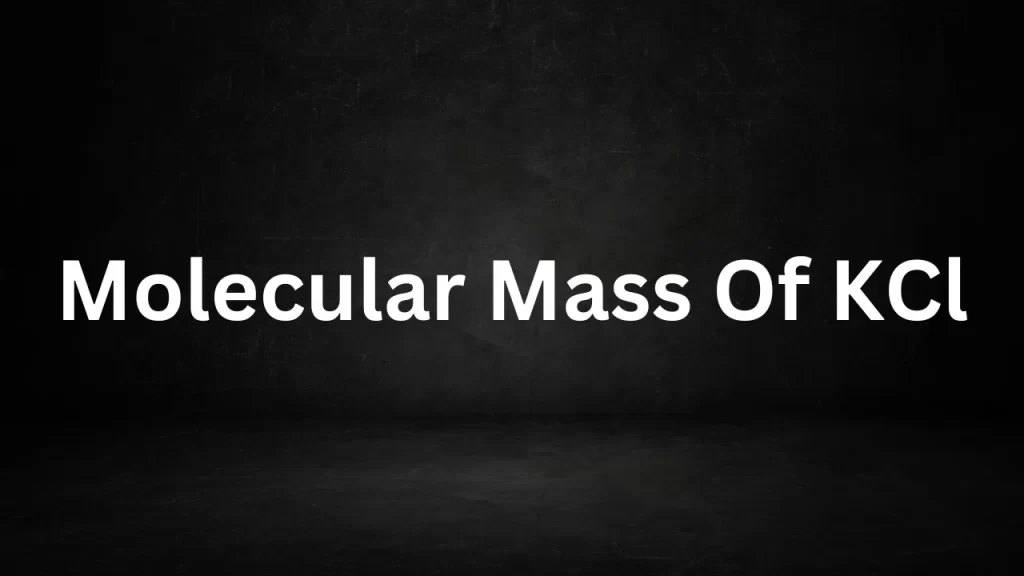Tag: weight of potassium chloride
Molecular Mass Of KCl
Molecular Mass Of KCl:Potassium chloride, denoted by its chemical formula KCl, stands as a widely acknowledged compound celebrated for its versatile utility across various domains, including medicine, agriculture, and food processing. In this article, we shall explore the molecular mass of potassium chloride, its importance, and its multifaceted applications in distinct fields.

Molecular Mass Of KCl
Understanding Potassium Chloride (KCl)
Potassium chloride, commonly denoted as KCl, constitutes a chemical compound containing two fundamental elements: potassium (K) and chlorine (Cl). Typically, it exists in the form of a white crystalline powder or granules. Potassium chloride finds extensive applications as a potassium source in fertilizers to promote plant growth, in culinary endeavors, and within the medical sphere, serving as an electrolyte replenishment solution.
Molecular Mass of Potassium Chloride
The molecular mass of potassium chloride is determined by adding together the atomic masses of its constituent elements:
- Atomic mass of potassium (K) ≈ 39.10 amu (atomic mass units)
- Atomic mass of chlorine (Cl) ≈ 35.45 amu
Now, let’s calculate the molecular mass of potassium chloride (KCl):
Molecular Mass of KCl = (1 × Atomic mass of K) + (1 × Atomic mass of Cl)
The Molecular Mass of KCl = (1 × 39.10 amu) + (1 × 35.45 amu)
Molecular Mass of KCl ≈ 74.55 amu
Therefore, the mole mass of potassium chloride is approximately 74.55 atomic mass units (amu).
Significance of Molecular Mass
The mole mass of potassium chloride is significant in several ways:
- Chemical Formulas: Molecular mass aids in determining the molecular weight of a compound, which is essential for understanding chemical reactions and stoichiometry.
- Medicine: In the medical domain, a comprehensive understanding of the molecular mass of potassium chloride is essential for precise patient dosing, particularly when it serves as an electrolyte replacement in intravenous fluids.
- Agriculture: In agriculture, the molecular mass plays a role in the formulation of fertilizers, ensuring the correct ratio of potassium for plant growth.
- Food Industry: The molecular mass plays a pivotal role in the sphere of food processing, especially when potassium chloride is utilized as a salt substitute or a flavor enhancer in low-sodium food items.
- Chemical Industry: Knowledge of the molecular mass is vital for manufacturers in the chemical industry to produce potassium chloride-based products accurately.
Conclusion
The mole mass of potassium chloride (KCl) is approximately 74.55 atomic mass units (amu). Understanding this value is crucial in various applications, including medicine, agriculture, and the food industry. Whether it’s promoting plant growth, replenishing electrolytes in medical settings, or enhancing the flavor of low-sodium foods, the molecular mass of potassium chloride plays a fundamental role in its diverse array of applications in our daily lives.
Read More
- Molecular Mass Of Fe
- Molecular Weight Of H2
- Molar Mass Of Methane
- Molecular Mass Of Sodium Hydroxide
- Molar Mass Of Ethyl Alcohol
Frequently Asked Questions (FAQs) On Molecular Mass Of KCl
1. What is KCl, and what does it stand for?
KCl is the chemical formula for potassium chloride. It is a chemical compound composed of potassium (K) and chlorine (Cl) atoms.
2. Can the molecular mass of KCl vary in different forms or compositions?
The molecular mass of KCl remains consistent, as it is a fundamental property of the compound. However, impurities or additives in commercial products may result in slight variations.
3. Why is the molecular mass of KCl significant in chemistry?
The mole mass of KCl is essential in chemistry as it helps determine the mole weight of the compound. This information is crucial for stoichiometry, chemical reactions, and the formulation of various products.
4. Is KCl commonly found in nature?
Indeed, potassium chloride is naturally present in certain mineral deposits, frequently in conjunction with salt deposits, predominantly sodium chloride. Moreover, trace amounts of potassium chloride can be detected in various food items.
5. What are some other applications of KCl beyond those mentioned?
Potassium chloride finds utility within the chemical industry, where it contributes to the manufacturing of a diverse range of chemical compounds and products. Additionally, it serves a purpose in processes related to water treatment and metallurgy.